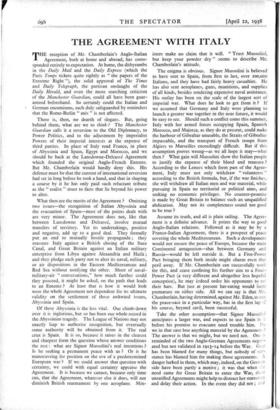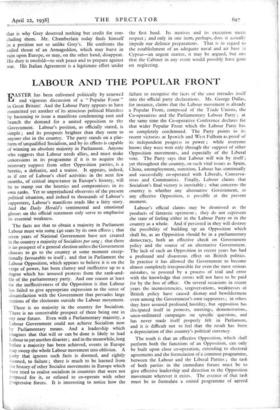THE AGREEMENT WITH ITALY T HE reception of Mr. Chamberlain's Anglo-Italian
Agreement, both at home and abroad, has corre- sponded entirely to expectation. At home, the dithyrambs in the Daily Mail and the Daily Express (which the Paris Temps tickets quite rightly as " the papers of the Extreme Right "), the solid approval of The Times and Daily Telegraph, the partisan onslaught of the Daily Herald, and even the more searching criticism of the Manchester Guardian, could all have been guar- anteed beforehand. So certainly could the Italian and German encomiums, each duly safeguarded by reminders that the Rome-Berlin " axis " is not affected.
There is, then, no dearth of slogans. But, going behind them, what are we to think ? The Manchester Guardian calls it a reversion to the Old Diplomacy, to Power Politics, and to the adjustment by imperialist Powers of their imperial interests at the expense of third parties. In place of Italy read France, in place of Abyssinia and Spain, Egypt and Morocco, and we should be back at the Lansdowne-Delcasse Agreement which founded the original Anglo-French Entente. But Mr. Chamberlain would hardly deny this. His defence must be that the current of international reversion had set in long before he took a hand, and that in shaping a course by it he has only paid such reluctant tribute as the " realist " must to facts that lie beyond his power to alter.
What then are the merits of the Agreement ? Omitting two issues—the recognition of Italian Abyssinia and the evacuation of Spain—most of the points dealt with are very minor. The Agreement does not, like that between Lansdowne and Delcasse, involve mutual transfers of territory. Yet its undertakings, positive and negative, add up to a good deal. They formally put an end to mutually hostile propaganda ; they reassure Italy against a British closing of the Suez Canal, and Great Britain against an Italian military enterprise from Libya against Alexandria and Haifa ; and they pledge each party not to alter its naval, military, or air dispositions in the Eastern Mediterranean and Red Sea without notifying the other. Short of naval- military-air " conversations," how much further could they proceed, it might be asked, on the path that leads to an Entente ? At least that is how it would look were the whole Agreement not dependent for its ultimate validity on the settlement of those awkward issues, Abyssinia and Spain.
Of these Abyssinia is the less vital. Our climb-down over it is inglorious, but so has been our whole record in the Abyssinian tragedy. The League of Nations may not exactly leap to authorise recognition, but eventually some authority will be obtained from it. The real crux is Spain. It is so, because it raises in the clearest and sharpest form the question whose answer conditions the rest : what are Signor Mussolini's real intentions ? Is he seeking a permanent peace with us ? Or is he manoeuvring for position on the eve of a predetermined European war ? If we could answer that question with certainty, we could with equal certainty appraise the Agreement. It is because we cannot, because only time can, that the Agreement, whatever else it does, will not 'diminish British rearmament by one aeroplane. Min- isters make no claim that it will. " Trust Mussolini, but keep your powder dry " seems to describe Mr. Chamberlain's attitude.
The enigma is obvious. Signor Mussolini is believed to have sent to Spain, from first to last, over roo,000 Italians, and they have had fairly heavy casualties. He has also sent aeroplanes, guns, munitions, and supplies of all kinds, besides rendering expensive naval assistance. His outlay has been on the scale of the largest sort of imperial war. What does he look to get from it ? If we assumed that Germany and Italy were planning to launch a greater war together in the near future, it would be easy to see. Should such a conflict come this summer, Italy with her armed forces occupying Spain, Spanish Morocco, and Majorca, as they do at present, could make the harbour of Gibraltar unusable, the Straits of Gibraltar impassable, and the transport of French troops from Algiers to Marseilles exceedingly difficult. But if this assumption proves wrong—as we all hope it may—what then ? What gain will Mussolini show the Italian people to justify the expense of their blood and treasure ? According to the Letters which form part of the Agree- ment, Italy must not only withdraw " volunteers " according to the British formula, but, if the war finishes, she will withdraw all Italian men and war material, while pursuing in Spain no territorial or political aims, and seeking no economic privileges. No counter-promise is made by Great Britain to balance such an unqualified abdication. May not its completeness sound too good to be true ?
Assume its truth, and all is plain sailing. The Agree- ment is a definite advance. It points the way to good Anglo-Italian relations. Followed as it may be by a Franco-Italian Agreement, there is a prospect of peace covering the whole Mediterranean. Such a development would not ensure the peace of Europe, because the main Continental antagonism—that between Germany and Russia—would be left outside it. But a Five-Power Pact bringing them both inside might charm even that peril away. If Mr. Chamberlain can successfully work for this, and cease confining his further aim to a Four- Power Pact (a very different and altogether less hopeful conception), he may indeed order his opponents to eat their hats. But just at present hat-eating would seem premature on either side. All we can say is that Mr. Chamberlain, having determined, against Mr. Eden, to run the peace-race in a particular way, has in the first lap of his course, beyond cavil, been successful.
Take the other assumption—that Signor Mussolini anticipates a larger war, and expects to use Spain in it before his promise to evacuate need trouble him. Do we in that case lose anything material by the Agreement ? The answer is that we might, but we need not. One is reminded of the two Anglo-German Agreements negoti- ated but not validated in 1913-14 before the War. Grey has been blamed for many things, but nobody of sub- stance has blamed him for making those agreements. A danger lurked in them, which may, indeed, on the Gen-11:n side have been partly a motive ; it was that when need came for Great Britain to enter the War, the unratified Agreements might help to distract her statesn• and delay their action. In the event they did not ; 2:1,1 that is why Grey deserved nothing but credit for con- cluding them. Mr. Chamberlain today finds himself in a position not so unlike Grey's. He confronts the veiled threat of an Armageddon, which may burst in ruin upon Europe, or may, on the other hand, disappear. His duty is twofold—to seek peace and to prepare against war. His Italian Agreement is a legitimate effort under the first head. Its motives and its execution merit respect ; and only in one item, perhaps, does it actually impede our defence preparations. That is in regard to the establishment of an adequate naval and air base in Cyprus—an urgent matter, it may be argued, but one that the Cabinet in any event would possibly have gone on neglecting.











































 Previous page
Previous page